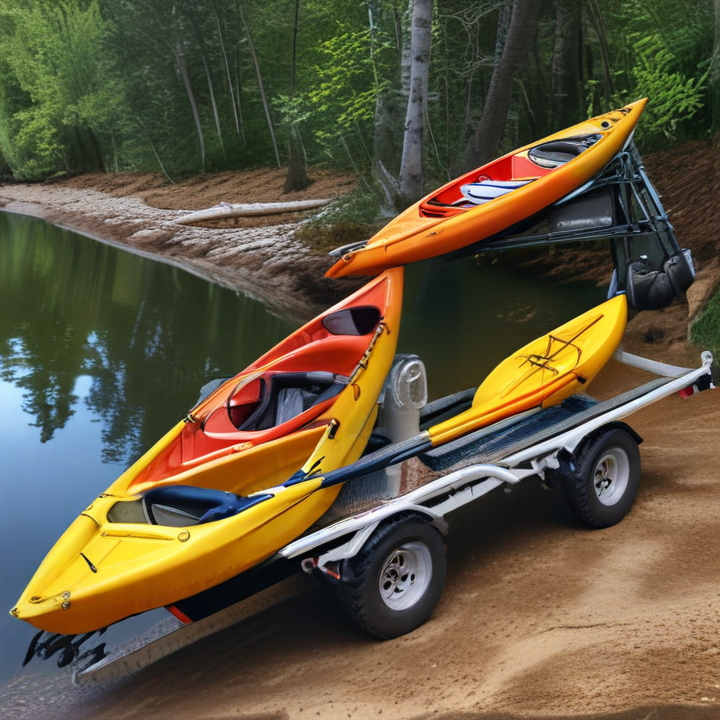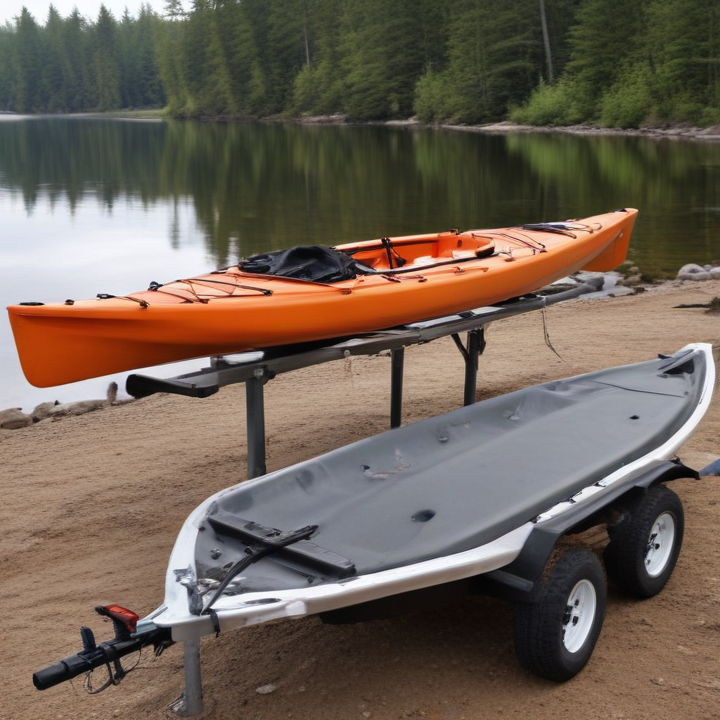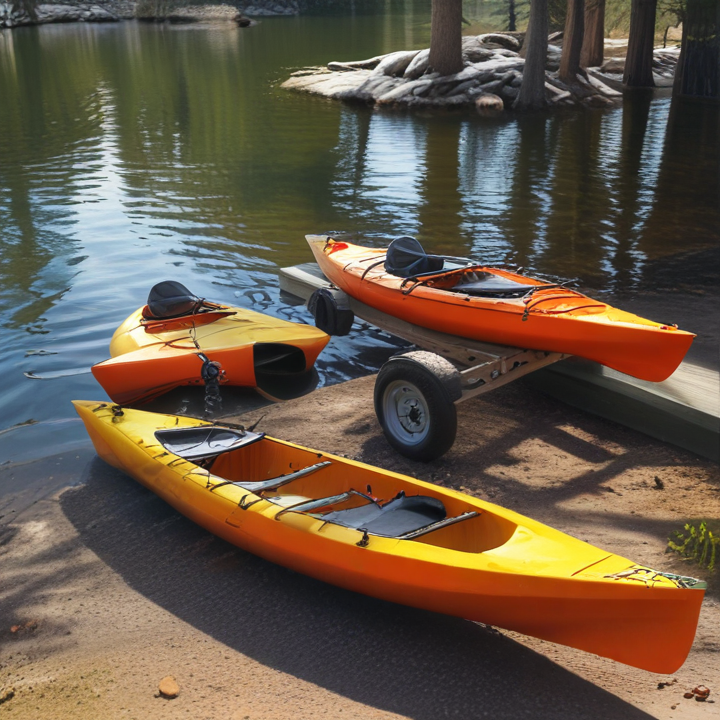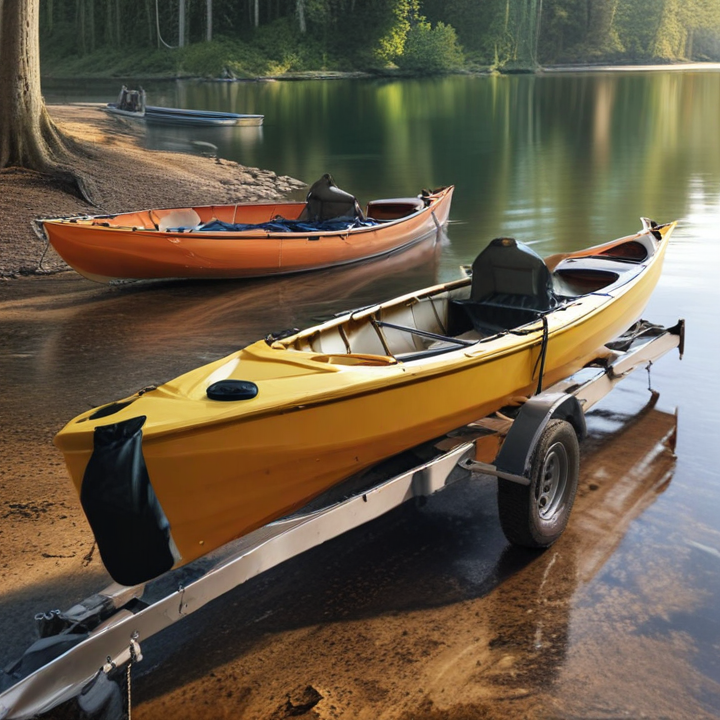kayak and canoe trailer Safety Certifications
When selecting a kayak and canoe trailer, safety certifications are crucial to ensure the trailer meets industry standards and provides safe transportation for your watercraft. Here are some key safety certifications and standards to look for:
1. National Marine Manufacturers Association (NMMA) Certification: This certification indicates that the trailer meets the American Boat & Yacht Council (ABYC) standards, which are widely recognized in the marine industry. NMMA-certified trailers have undergone rigorous testing to ensure safety, reliability, and performance.
2. Department of Transportation (DOT) Compliance: Trailers used on public roads in the United States must comply with DOT regulations. This includes proper lighting, reflectors, and braking systems. Look for trailers that are DOT-compliant to ensure they meet federal safety standards.
3. European Union (EU) Certification: If you are in Europe, look for trailers that comply with the European Union’s ECE R13 standards. This certification ensures the trailer meets safety and performance criteria set by the EU.
4. Australian Design Rules (ADR) Compliance: For those in Australia, trailers must comply with the ADR. These rules cover various aspects of trailer design, including braking, lighting, and structural integrity.
5. Quality Assurance Marks: Look for additional quality assurance marks from reputable testing organizations such as TÜV (Technischer Überwachungsverein) or SGS (Société Générale de Surveillance). These marks indicate that the trailer has been independently tested for safety and quality.
6. Manufacturer’s Warranty and Support: A good warranty and customer support from the manufacturer can also be an indicator of a trailer’s quality and safety. Check the warranty terms and read reviews to ensure the manufacturer stands behind their product.
Always ensure that the trailer you choose is suitable for the size and weight of your kayak or canoe and that it is properly maintained. Regular inspections and maintenance are essential to keep the trailer in safe working condition.
List Reference Technical Parameters of “kayak and canoe trailer”
When considering the technical parameters of a kayak and canoe trailer, several key aspects should be evaluated to ensure it meets your needs. Here are the primary parameters:
1. Load Capacity: This refers to the maximum weight the trailer can safely carry. It typically ranges from 200 to 1000 pounds, depending on the trailer’s design and construction.
2. Trailer Weight: The weight of the trailer itself can affect towing capacity and ease of handling. Lightweight trailers may weigh around 100 pounds, while heavier-duty models can weigh upwards of 300 pounds.
3. Dimensions: The overall length, width, and height of the trailer should be considered, especially in relation to storage space and maneuverability. Common lengths range from 10 to 20 feet, with widths typically around 4 to 6 feet.
4. Number of Kayaks/Canoes: Trailers can be designed to carry one or multiple kayaks or canoes. Multi-boat trailers often feature tiered or side-by-side configurations.
5. Material: Trailers are usually made from steel or aluminum. Steel is durable and strong but can be heavier and prone to rust. Aluminum is lighter and resistant to corrosion but can be more expensive.
6. Tire Size and Type: The size and type of tires affect the trailer’s stability and ability to handle different terrains. Common sizes include 12-inch to 15-inch tires, with options for highway or off-road treads.
7. Suspension System: The type of suspension, whether leaf spring or torsion, impacts the smoothness of the ride and load handling. Torsion suspensions provide a smoother ride but can be more costly.
8. Hitch Compatibility: Ensure the trailer’s hitch is compatible with your vehicle. Common hitch sizes are 1-7/8 inch, 2 inch, and 2-5/16 inch.
9. Braking System: For larger trailers, a braking system may be necessary for safety, especially when carrying heavy loads. Options include surge brakes and electric brakes.
10. Additional Features: Look for added conveniences such as adjustable racks, locking mechanisms, and storage compartments for paddles and gear.
These parameters will help you choose the right kayak and canoe trailer for your specific needs.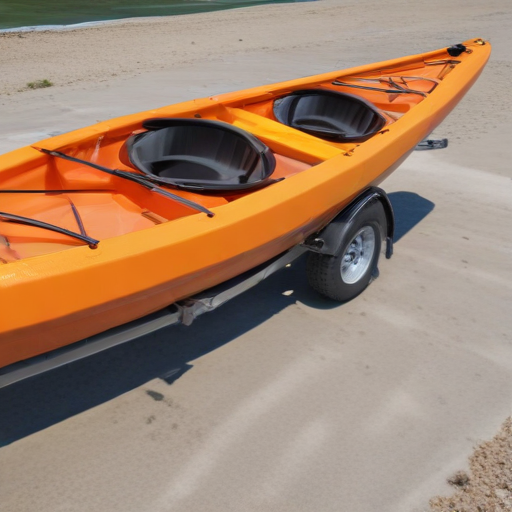
List Product features of “kayak and canoe trailer”
A kayak and canoe trailer is designed to transport kayaks, canoes, and other small watercraft. Here are the key features:
1. Durable Construction: Built with robust materials like galvanized steel or aluminum for longevity and resistance to rust and corrosion.
2. Load Capacity: Can typically carry multiple kayaks or canoes, often supporting weights from 200 to 800 pounds or more, depending on the model.
3. Adjustable Racks: Features adjustable crossbars and brackets to accommodate various sizes and shapes of watercraft securely.
4. Easy Loading and Unloading: Low height design and sometimes integrated loading ramps or rollers make it easy to load and unload kayaks and canoes.
5. Tire and Suspension: Equipped with high-quality tires and suspension systems to ensure smooth and safe transportation over various terrains.
6. Tie-Down Points: Multiple tie-down points and straps to secure the watercraft firmly during transport.
7. Lightweight Design: Often lightweight for easier maneuverability and better fuel efficiency when towing.
8. Compact and Foldable: Some models are designed to be compact or foldable for easy storage when not in use.
9. Compatibility with Vehicles: Compatible with a range of vehicles, typically featuring a standard hitch connection.
10. Safety Features: Includes necessary safety features like brake lights, reflectors, and safety chains to ensure compliance with road safety regulations.
11. Versatile Use: Suitable for transporting not just kayaks and canoes but also paddleboards, surfboards, and small boats.
12. Customization Options: Some trailers offer customizable options like additional storage boxes, kayak cradles, or bike racks.
13. Ease of Assembly: Generally designed for easy assembly, often requiring basic tools and minimal setup time.
14. Warranty and Support: Many come with a manufacturer’s warranty and support for peace of mind and assistance in case of issues.
These features collectively make a kayak and canoe trailer a versatile and essential tool for outdoor enthusiasts who regularly transport their watercraft.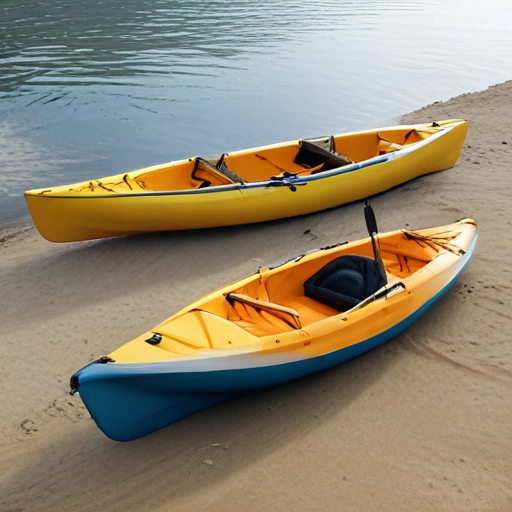
“kayak and canoe trailer” Warranty and Support
Warranty and Support for Kayak and Canoe Trailer
#### Warranty:
Our kayak and canoe trailers come with a comprehensive 3-year warranty from the date of purchase. This warranty covers any defects in materials and workmanship under normal use and maintenance. If any component of the trailer fails due to manufacturing defects, we will repair or replace the defective part at no additional cost to the customer.
Please note that the warranty does not cover damage caused by improper use, accidents, unauthorized modifications, or routine wear and tear. To maintain the warranty, customers must adhere to the provided maintenance guidelines and keep a record of all service activities.
#### Support:
We are committed to providing exceptional customer support. Our dedicated support team is available to assist with any questions or issues you may encounter. We offer:
1. Technical Assistance: Our experts can help with installation, troubleshooting, and maintenance queries.
2. Replacement Parts: Easily order any replacement parts through our website or customer service.
3. User Manuals and Guides: Access comprehensive user manuals and video tutorials online for detailed instructions on trailer use and care.
4. Customer Service: Contact our support team via phone, email, or live chat for prompt and friendly assistance.
We strive to ensure that our customers have a seamless experience with our kayak and canoe trailers. For further information, please visit our support page or contact our customer service department.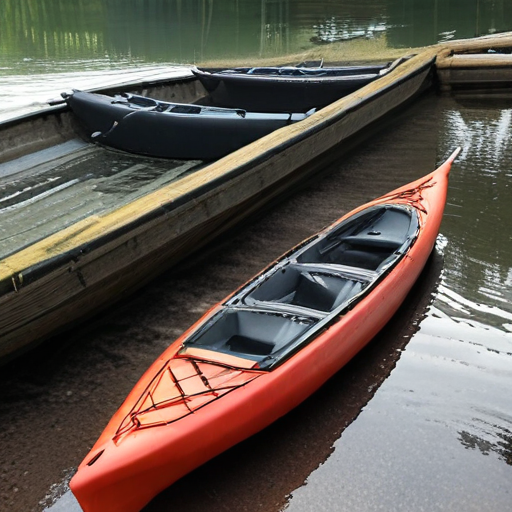
List “kayak and canoe trailer” FAQ
Kayak and Canoe Trailer FAQ
1. What types of trailers are available for kayaks and canoes?
– Single and Multi-Boat Trailers: Designed for transporting one or multiple kayaks/canoes.
– Utility Trailers: Can be modified to carry kayaks/canoes along with other gear.
– Foldable Trailers: Compact and easy to store when not in use.
2. How do I choose the right trailer for my kayak or canoe?
– Capacity: Ensure the trailer can handle the weight and size of your boats.
– Material: Opt for rust-resistant materials like galvanized steel or aluminum.
– Axle and Tires: Consider the terrain; off-road use requires sturdier axles and tires.
3. Do I need a special hitch for towing a kayak or canoe trailer?
– Compatibility: Most standard hitches will work, but ensure it matches your vehicle’s towing capacity.
– Class of Hitch: Class I or II is often sufficient, but check the trailer’s requirements.
4. Are there legal requirements for towing a kayak or canoe trailer?
– Registration and Insurance: Varies by state/country; often required.
– Lighting and Safety Gear: Ensure the trailer has functioning lights and safety chains.
5. How should I load and secure my kayak or canoe on the trailer?
– Balance and Weight Distribution: Place heavier items towards the center to avoid sway.
– Straps and Padding: Use padded straps to secure boats without damaging them.
6. Can I modify a regular utility trailer for kayaks and canoes?
– Conversion Kits: Available to adapt utility trailers with racks and cradles.
– DIY Modifications: Adding padding, crossbars, or custom racks can make a utility trailer suitable.
7. What maintenance does a kayak or canoe trailer require?
– Regular Checks: Inspect tires, lights, and hitch before each trip.
– Cleaning: Rinse off saltwater and debris to prevent corrosion.
– Lubrication: Grease wheel bearings regularly to ensure smooth operation.
8. Are there any special tips for long-distance towing?
– Frequent Stops: Check the load and trailer condition periodically.
– Speed and Driving: Drive slower than usual and allow for longer braking distances.
9. Where can I buy kayak and canoe trailers?
– Retail Stores: Outdoor and boating equipment stores.
– Online Retailers: Websites like Amazon, eBay, and specialized trailer vendors.
– Second-Hand: Classified ads, online marketplaces, and local bulletin boards.
10. How much does a kayak or canoe trailer cost?
– Price Range: Basic models start around $500, with high-end trailers costing upwards of $2,000 depending on features and capacity.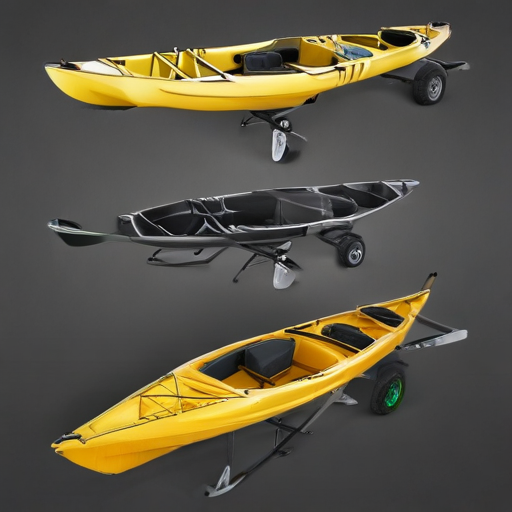
Top 10 FAQ with answer about kayak and canoe trailer for Buyer Sourcing from China
Top 10 FAQs About Sourcing Kayak and Canoe Trailers from China
1. What are the common materials used for kayak and canoe trailers?
– Trailers are typically made from steel, aluminum, or galvanized steel. Aluminum is popular for its lightweight and rust-resistant properties.
2. What is the average lead time for production and shipping?
– Production lead time ranges from 30 to 45 days. Shipping can take an additional 2 to 6 weeks, depending on the destination and shipping method.
3. Are there customization options available?
– Yes, many manufacturers offer customization in terms of size, load capacity, color, and branding. Be sure to discuss your requirements upfront.
4. What certifications should I look for?
– Look for ISO, CE, or other relevant certifications to ensure quality and compliance with international standards.
5. How can I verify the quality of the trailers?
– Request samples, visit the factory if possible, or hire third-party inspection services to ensure the quality meets your standards.
6. What is the minimum order quantity (MOQ)?
– MOQs can vary but generally range from 10 to 50 units. Some manufacturers may offer flexibility depending on the order specifics.
7. Are there warranties or guarantees offered?
– Most reputable manufacturers provide warranties ranging from 1 to 3 years. Confirm the warranty details before purchasing.
8. What payment terms are usually accepted?
– Common payment terms include T/T (Telegraphic Transfer), L/C (Letter of Credit), and sometimes PayPal for smaller orders. An initial deposit (30%-50%) is often required.
9. Can I get spare parts and accessories?
– Yes, manufacturers often supply spare parts and accessories. Make sure to inquire about their availability and cost.
10. What are the shipping costs and options?
– Shipping costs depend on the trailer size, weight, and shipping method (sea or air). FOB (Free On Board) and CIF (Cost, Insurance, and Freight) are common shipping terms used.
When sourcing kayak and canoe trailers from China, thorough research and clear communication with manufacturers are crucial to ensure you receive quality products that meet your needs.

